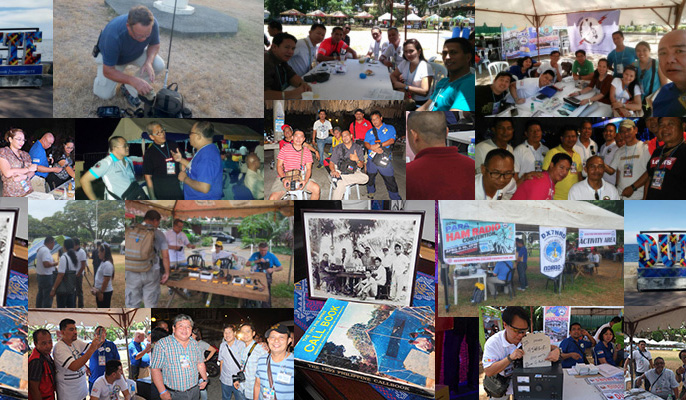
What is amateur Radio? Its the best fun ever if you’re even slightly technically minded! It’s also a service in which you, the radio amateur, or ham, can play a part in helping with recovery from disasters such as floods, earthquakes and typhoons by using your own radio equipment and antennas to communicate with first responders and government agencies whose own communications have been knocked out.
When cell phone towers topple then amateur radio is usually the only way to communicate from the stricken areas for the first few days after a disaster. Many “hams” also give service by working within their communities to help during charity fun runs, for example, using their portable vhf radios to communicate trouble spots and assist medical teams to efficiently cover a particular area, or during Easter week to help out their kababayans on the road as they travel to and from the provinces, by setting up base stations along the way.
Of course it’s not all service and duty, those are optional. Many hams enjoy talking to distant stations in other countries and other continents using various modes such as Morse code, digital modes, even TV, not just using a microphone, and many just enjoy simple “ragchewing’, chatting away on the 2m band. The options are almost endless and only limited by your imagination.
Think about contacting another ham station on the other side of the world by using the moon to reflect your signals! Some hams have even received signals from Mars probes! On the other side of the scale, many hams enjoy using very low power to communicate all over the world.
PARA has it’s own radio station at the 4th floor of the National Telecommunications Commission Central Office in Quezon City and you are welcome to drop in during the week and perhaps operate the PARA ham radio station. If you do not yet have an Amateur Radio license, Dolly or Gilbert will assist you with information about how to study and pass the NTC licence test. It’s not difficult as many non technically minded people have passed with flying colors after attending the seminar and studying the supplied materials. There is now a Novice licence which is very easy to pass and allows operation on the popular 2m (144 MHz) band.
Wherever you live in the Philippines there is usually a ham club nearby with friendly members who will assist you in your endeavors to study and become a ham radio operator. Many clubs hold seminars for potential hams, so contact PARA to find out more.
You may get in touch with us at the following address:
Philippine Amateur Radio Association
4th Flr. NTC Building, Agham Road, Quezon City
Telephone: +63 2 668 9125
Email: para1932@gmail.com
- adapted from the original Amateur's Code, written by Paul M. Segal, W9EEA, in 1928